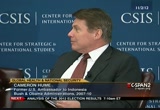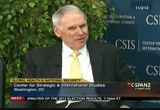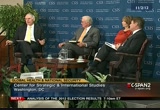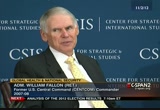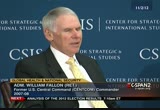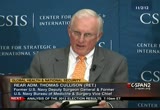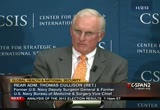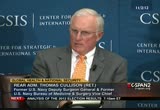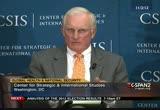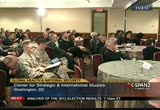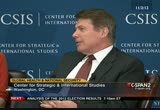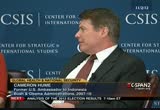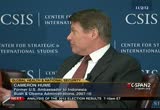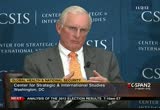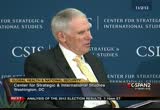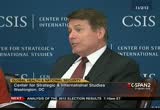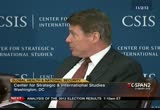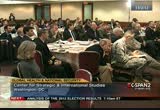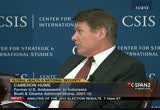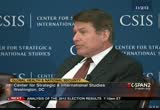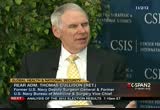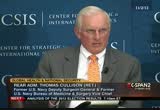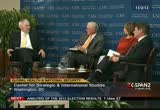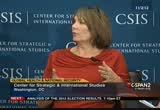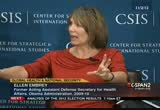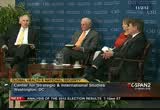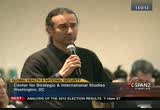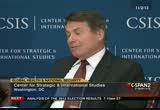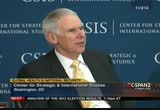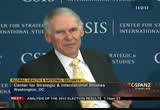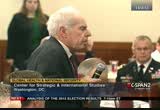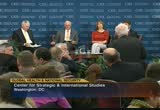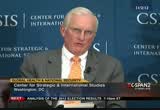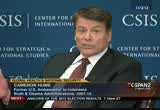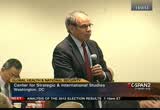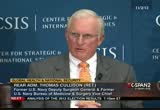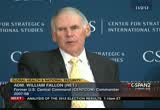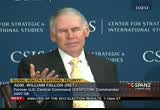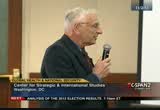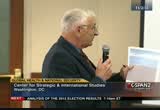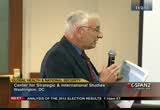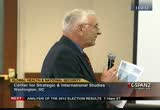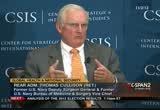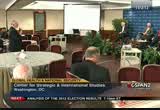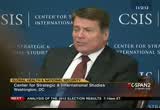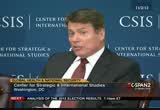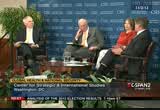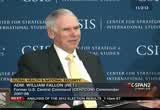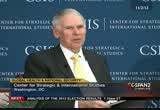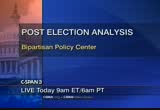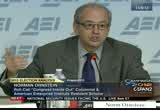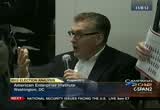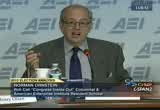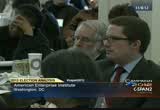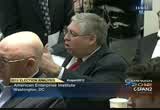tv Today in Washington CSPAN November 9, 2012 6:00am-9:00am EST
6:59 am
>> when the crisis comes up, no matter how capable your people or, if they dropped the someplace and it's like, what good is it? so i would say this is the best thing for the country team to do. unique people to go out on a regular basis and establish those human relationships. if i thought, i would also say look at how we behave in the most difficult places. we sent people for short period of time. one year, two years, society a
7:00 am
distress. actively means you never know what you are doing it. and if we want to prepare to deal with societies under stress i think we have to be a little more honest with ourselves, think about the civilians we deploy. we have to be honest with ourselves and say, if you're going there, you go for longer breed of time, build those relationships because when it gets worse, we are really going to need debt. and i think there's something that we can do that we've shied away from. because in general, civilian agencies don't like to thank the of the authority to tell somebody to go somewhere, get a different job. >> i agree. i think though that one of conferences can with the nexus of global health initiative security intersect, and i think there's no finer planning organization in this world than
7:01 am
the u.s. military, to understand and think through all the secondary and tertiary, primary elements of a plan and how to execute it. so, leveraging that skill set and engaging with the appropriate authorities on how to respond to a health emergency, and how you would address these issues well before the incident occurs is probably the best solution. now, those teams probably exist to do that. but whether or not, it really depends on their maturity of that country and its ability to leverage very scarce resources. just like in the u.s., our health care professionals barely have enough time to address the day-to-day health care needs of the population, let alone planning for emergency. this is the challenge, but i think this is where the military and the u.s., in collaboration
7:02 am
with its other federal partners, can be extraordinarily successful. >> in the back. i think we're probably just about running out of time, so the mic is behind you. core question. >> i'd like to refer back -- university of wisconsin republic referred back to ambassador hume's reference to the shipping incident. that brings to mind what happened in nigeria in 2005, roughly, about the vaccination against polio were worldwide campaign to eradicate polio was stopped because of political education against it, and allegations that it was intended to sterilize children, to produce other things like that. and i'm wondering, was that an anomalous situation? are we likely to see events like that in the future against western intrusion? and what do we think would be the best approach to fight
7:03 am
situations like that, if they arise? and would your response be able to address, are those efforts on our part to address that likely to remain more difficult because of the alleged involvement of a doctor or health research project involved in the plot that led to the assassination of osama bin laden? >> i think human history is we plead with cases of man's policy. i think that human history is replete with cases of mass fall the. you know, are you going to continue to get occasionally sporadic complaints that the western involvement in health issue as a plot? i think the answer is yes. i don't, i don't find it, i may
7:04 am
find a crazy but not surprising. and i think what you have to do is you have to look to your own values and be sure you're doing the best you can come and you have no doubts. but i don't think you can make any comment everyone happy all the time. >> so, i'm afraid we've run out of time here. i know there are many of you who have had your hands up for a while. but i think it makes, makes the point that this is the business of health, security, the military, we tend to think of them often as still points. they're not. relationships are constantly running. and particularly in today's interconnected and very rapidly changing world. ideas, thoughts, good and bad, as well as wonderful preventions
7:05 am
and interventions that could help people are running all the time all over the world. so the key for us, a couple of takeaways here, if i could try to wrap this up. first of all, i want to thank the panelists for their wonderful wisdom and willingness to engage who and not be thrown some beat on the table there, which probably ought to be chewed up by some others. thanks very much. [applause] >> to the audience, you've been terrific. can't believe you have state alert, chipper. not only that, but still, i'm sure they're probably 20 hands after the want of their questions addressed, so steve, you have to do a reprise here sometime. this is a really important topic, in my view. one that still needs a lot of work. we've identified a number of issues that some folks that have
7:06 am
already left to work to go work them. thanks for your interest, participation, but it is at hard labor, and looked in the future for your continued engagement. thanks very much. [applause] [inaudible conversations] >> on c-span2 this month american enterprise institute analyze election results are >> i need some help over here.
7:07 am
>> does anyone know have? >> he just rolled himself out. >> we ended up following him after this plane ride for many months, as i said. and he ended up injuring himself into an program at walter reed where he ended up using acupuncture, using meditation, using other techniques to wean them off all the drugs he was on, and through this program he actually was able to walk out at walter reed on his own two feet. so i really commend the military
7:08 am
for two things. for one, for allowing us to tell his story, both good and bad the bad, but recognizing this problem, by recognizing that there is this problem of overmedication and that they are looking for outside the box ideas on how to fix it. that sort of the whole thesis of the film really. the metaphor of "escape fire" is the status quo isn't working and we need to start looking for outside the box ideas. >> more with treachery, producer and director of "escape fire." sunday night at 8 p.m. on c-span's q&a. >> today, discussion on national security issues facing president obama in his second term put together by the world affairs council. it's like starting at 90 in eastern here on c-span2. and over on c-span3, political analysts and consultants.
7:09 am
that's live from the bipartisan policy center at 90 in eastern on c-span3. >> if there's a mandate in yesterday's results, it's a mandate for us to find a way to work together on the solutions to the challenges that we all face as a nation. my message today is not one of confrontation, but one of conviction. in the weeks and months ahead we face a series of tremendous challenges and great opportunity. >> american people want us to work together. republicans want us to work together. democrats want us to work together. they want a balanced approach to everything but especially the situation that we have dealing with the huge deficit and taxes are part of that. >> the newly elected congress trucks work in january but the current congress still has work to do through the end of the
7:10 am
year in what is to refer to as a lame-duck session. work as expected on the impending fiscal cliff, including the expiration of bush-era tax cuts, the federal deficit, raising the debt ceiling and by how much. possible cuts to domestic and military spending, also known as sequestration. follow all the florida-based starting tuesday with white house coverage on c-span and the senate on c-span2. >> next, fox news channel contributor michael barone and norman ornstein examined election results. this event was hosted by the american enterprise institute. it's just under two hours. >> good afternoon. minus karlyn bowman, i'm a senior fellow here at aei, and on behalf of my aei colleague, michael broken norm ornstein and henry olsen, and our c-span viewers, i'd like to invite all of you to this final session of the aei election watch 2012 season.
7:11 am
i'd like to breed and produce one of our colleagues, ben wattenberg, who helped to start the aei election watch series in 1982. ease with us here today. ben wattenberg and the late richard scam and were the first people to look at the interaction of demography and public opinion data in the 1970 book, the real majority. they told us that important changing demographics of the two future elections, and in this election are pathbreaking insights have been confirmed. like he knows were a larger share of the electorate and four years ago, and a vote as this new issue of aei's monthly political report shows, solidly for president obama. if ron had done so with respect as reagan did in 1984 and bush in 2004, the outcome of this election would have been different. between the 2000-2010 census, asians were the fastest growing ethnic group in the country and in this election that also voted
7:12 am
heavily for the president. african-americans are very slow growing demographic group that their turnout did not decline this year and they did more than 90% of the votes to the president. so while demography is not destiny, it is certainly important to the demographer joel cotten said demography is the best friend the democrats have. stamina and wattenberg talk about the dayton housewife is key to the vote in 1972. in this election women were 53% of the electorate and they voted solidly for obama. men voted for romney. white, black and hispanic women were more democratic than white-black and hispanic men. the gender gap lives at 18 percentage point to women in ohio voted for obama, men in ohio voted for romney. the marriage gap was a whopping 41 points with america voters decide as a republican in this election, and a growing group of nonmarried overwhelmingly
7:13 am
democratic. all of these data are in our new aei political report prepared by andrew. we also want to thank claude for getting the support done with all of the latest 2012 data from 22 key demographic groups available for you today. the demographic changes are being felt in congress, too. david wasserman of "the cook political report" wrote that for the first time ever white men will no longer be a majority of the democratic caucus. in 1953, he says there were 98% of house democrats, and 97% of house republicans. along with the demographic data, the exit polls show obama was able to choose the economic issue, and he won overwhelmingly on empathy. we are going to begin today with michael barone who will tell us what happened and why. all of us on this bill have made election predictions over the course of election watching. sometimes we get it right, sometimes we get it wrong. in his "washington examiner"
7:14 am
column yesterday, michael said flatly, i was wrong. but he followed up with the line, i take some pleasure in finding that i've been wrong because it is an opportunity to learn more. i think we all share that sentiment. after michel's speech will turn to henry olsen to talk about what defeat means for the republican party. the firing squad is assembled and the recriminations phase has begun. the "washington times" said in an editorial that chris christie should be excommunicated. [laughter] and jenny beth martin, head of the tea party patriots had this to say about romney. he was weak, moderate, handpicked by the establishment and about what -- beltway elite. it doesn't work and it is time to find someone who embraces our value to henry will tell us what values the bar should learn. henry by the way called the popular vote on the nose in this election. he and nate silver deserve kudos overall pick finally we're going
7:15 am
to turn to norm to talk about what this election means for the house and the senate and this is quickly. i should report that norms a book is even worse than it looks, is once again, here it is for all of you great christmas gifts. it's number 20 on amazon today. it's been on a best seller list almost consistently since it appeared. we want to ask norm whether not the republicans have a lock on the house going forward, and what the new congress is going to tell us about future events. michael, we will begin with you. >> okay, thank you very much, karlyn, and thank you for noticing my fallibility. it's been there since i told all my law school classmates that nelson rockefeller was going to be defeated for reelection in 1966. i should have remained shy about predictions after that when. barack obama won this election by a 50-48% margin. that may go up to around off 51-48 when california comes in
7:16 am
california's last time to wipe weeks to count its votes. account with five cars in brazil but i'm not sure what california is so much less technologically advanced. but there we are. for all these figures are necessarily a little incomplete as they apply to the nation. there's some other states with votes still out, too. it appears that obama will get a huge electoral vote advantage out of this relatively narrow popular vote margin. assuming he carries florida what he is in current counts ahead in the miami-dade county, people are this year counting votes without the assistance of many republican and democratic lawyers. with florida commit electoral vote, 332-206. bush was a 51-40 margin in 2004 only got 286 votes. obama was slightly less it appeared, gets 332. i think there's a certain
7:17 am
structural demographic advantage for democrats in the electoral college in this era. democratic voters tend to be clustered in something large metropolitan areas, and in particular neighborhoods, and to give the democrats an initial advantage in the electoral college. president obama got 57% or more of the popular vote in 11 states and the district of columbia, and they have 163 electoral votes. romney won 13 states that such margins of the only have 104 electoral votes basically the democrats have a bigger hunting ground, a larger base in the electoral college and a bigger hunting ground to go find those votes. brac obama in two campaigns has been very successful with 365, and apparently 332 this time, and 303 if he doesn't carry florida. this election cycle has been compared by many people to 2004, the election, reelection of an incumbent president by
7:18 am
mobilizing supporters and getting them out. i think it's more like 1996, which was a different election. one respect is, in one respect it clearly was. turnout was way up in 2004 from 105 million in 2000. turnout was down in 1996. you know, i have a hypothesis that when economic issues are at issue, economic contentment and 96 economic discontent in 2012, it doesn't bring voters as much to the polls as when not economic or cultural issues or war or peace issues are at issue as seeking to be in 2004. and one respect it was unlike both 1996 in 2004. clinton and bush both won with increased margins.
7:19 am
clinton's 49% in 96 would've been 51 or 52 if you split the pro-vote, according to second choice. that was an increase from his 43% in 1992. bush pushes popular vote up from 48% to 51%. obama, however, declined from 53% to 50%, or possibly 51. his victory was a victory for big government policies at obamnicare will surely stay in place, and, obviously, the president, the democratic majority in the senate will have a lot to say of fiscal issues, which norm i gather will discuss. less of a victory i think for big government ideas. clinton pivoted to the center on issues and while the voters not enthuse gave him larger percentages. obama rant essentially a negative campaign against romney with the firewall strategies, spending about half of preconvention dollars and energy on a free firewall states,
7:20 am
florida, ohio and virginia. where the lowest percentage of states for barack obama. they have, though states together have 60 electoral votes. they were important. with him, obama would. a 332 electoral votes. without them he would have 272 which would mean only one other state would have tipped. there's not a likely candidate as you look down the percentages in this election, but it was nonetheless close. and i think this proved to be effective. he carried them he is currently carried florida by 46,000 votes, ohio by 107,000, and virginia by 100,000. those 253,000 vote margin are responsible for his big electoral vote margin. it's a classic example of a high risk strategy.
7:21 am
the obama strategists are now going to be hailed with some appropriateness as brilliant for employing this strategy. faq numbers it turned out a little differently they might be excoriated, but the fact is that they succeeded. and i think when you compare movement of the target states and non-target states, if you look at a target states, colorado, florida, iowa, nevada, ninja, north carolina, ohio, virginia, obama's percentage only declined 1.5% from 2008. in the rest of the country whether you're talking about solving republican or solidly democratic states are the kind of late target states, minnesota, pennsylvania, wisconsin, obama's percentage was down 2.8%, about double the amount. that he still would carry the rest of the country, aside from the target states, but not as big a percentage. one of the fascinating things about this election is an
7:22 am
electorate that believes things are moving in the wrong direction and is getting congress dismal job ratings reelected democratic president, retained, adding even more republican -- democratic senate with some powerful assists from some republican candidates. [laughter] wonder if they've investigate the possibility of moles. anyway, they retained a republican house. got an article in "wall street journal" coming out tomorrow on this issue, the house issue. republicans come according to current can come have a net loss of only six seats in the house. they started off as compared to 2012 results when it went, or 2010 when they won, 242. that's big and the majority and when newt gingrich was speaker. that's despite a losing, these cuts will change a little as the final results are tidy dated,
7:23 am
that's a losing five seats each in illinois, california in redistricting, republicans nonetheless had minimal losses here. unlike, so this is another way it's different from 1996. clinton won by a wide majority, republicans barely held onto majority in the house. this year, obama won by a narrower george and republicans maintained, retained a relatively large house majority although not as large as democrats had after 2006 and 2008 election. so i think john boehner has some basis for saying that as the president has demanded, so do house republicans. popular vote for house republicans will probably come out something like 50-48, by which obama beat romney. that hasn't been fully tabulated yet. back about 20 years ago, circa
7:24 am
1990, political scientists and pundits said republicans have a lock on the presidency and democrats had a lock on the house. they had all sorts of good reasons why this was so. the democrats picked the lock on the presidency in 1992, republicans broke the lock on the house in 1994. starting with this election, democrats have won four of the six presidential elections and won a plurality of popular vote in another. republicans have won majority in six out of eight elections for the house representatives. so, this is, no, eight out of 10. in the house of representatives. looking back from 2014 them back 20 years to 1994, we will have had during that period or 10 years a democratic president and republican house. two things that people in 1990 said could never happen.
7:25 am
so it's something like the new normal. the period before 1990, the normal was republican president, democratic house. it seems to be the reverse. and that happens i think the democratic -- demographic reason is democratic votes are clustered in the big metropolitan areas. john mccain -- excuse me, barack obama in 208120 congressional bishops with 80% of vote more. john mccain 10 by the margin. against democrats a lot of votes in those big states, but it also means there's not that many democrats into chasing districts. this time obama probably cared about the same number of states with a percentage. romney may have gotten that percentage and where to districts in utah. so maybe it's time for a political scientist and as political pundits to roll out another go about ochs, who has a lock on which part of the
7:26 am
government before that will, too, becomes obsolete. thank you. >> now and it will tell us about the republican party. >> i think the temptation for republicans, going through any case, is going to be engaging in denial. and that's what you saw with the "washington times" piece that karlyn today. it's understandable. it's the human response. but it would be very smart for the publicans to get farther along from those stages and not stay in the denial stage very long. because when you look at what we have to face, it is not a hopeless picture but it is not a pretty one. karlyn has talked about the demographic changes. that is something that there is nothing that any republican camp can do anything about. even if we stopped immigration
7:27 am
100% tomorrow, which frankly no one wants to do. the numbers that are already baked into session case, it will continue to rise because longevity differences between males and females, the share of women in the electorate is going to slightly rise over that period because very frankly as people live longer, men will die 80 and women will live until monday. will have a slightly larger share of women in the electorate as well. it's really not a good idea to ignore that. one fact i would like to focus on for my presentation today is an exit poll number that has not gotten a whole lot of attention, but i'm single-handedly trying to resurrect. that is, at the end of the exit poll, the voters were asked which of the following or quality is most important to you
7:28 am
in selecting a president. romney won three of those, and he won each of those by double digits. he was a selection of the person people said they most valued having a strong leader. he was the choice of the people who said they most valued somebody who had a strong vision for the country. and he was the choice of the people who said that the most valued having someone who shared her own values. the recent mitt romney is not president today, and i said that the reason why conservatism generally has been locked in a 50% ceiling nationwide since the end of the cold war, even though sometimes we can translate that into majorities in the house, is because of the last group. the last group, and that question is the thing that they valued most is somebody who cares about people like them.
7:29 am
cares about people like me. mitt romney lost that group 81-18. and when you lose 20% of the electorate, by 63 points, that's a problem. and it makes sense that you reduces in light of the campaign that both candidates ran, but particularly the campaign that the obama campaign ran, which is simply a modernization of the campaign that democratic candidates turn to it in difficult times ever since the new deal coalition won in 1932. in canada, the conservative party won the most recent elections by tarnishing the leader of the liberal party and in a parliamentary system that is basically akin to campaigning against a presidential candidate. a harvard professor, a canadian native who returned to his country to run for parliament, labour party candidate. the liberal party is dominant
7:30 am
canada since the great depression. and what they did was they systematically painted him as somebody who by his experience in sight is out of touch with the aspiration of the ordinary canadian and a television ad had a tagline that was brutal and succinct. he didn't come back for you. the obama campaign wasn't so brutal in its overt message but was as brutal in its covert message. the message that they decided on was essentially to say that the romney republican agenda, and they're always very clever, as time than to his party is he and they are not running for you. and they did it on the level of values. for women, what was the work of women against women about. what was the contraception issue about, but to say they don't understand you, they don't care about you. they don't value you, they are not running for you.
7:31 am
what was obtained about? what was tax cuts for the wealthy about? it was talk to the blue-collar struggling worker, white-black, hispanic or asian the struggles from paycheck to paycheck, they go through periods of uninsured each year to say when it comes to the economy, they think that the ways to give difference more money and hope that they do well by you. if you believe that, they are not running for you. latinas, that's what the immigration was about. you want to be a part of the american dream? they won't even pass the dream act. they are not running for you. anyone have any question is too wide, with this series of arguments and that the series of consistency that tyson interweaves into a my launch that makes sense. why? will% of americans who think that caring about people like him is the most important feature in a national leader. why they would select the person who is making that argument
7:32 am
against a person who said that the running for them. now, republicans have to admit that as much of that is a caricature of romney and as much of that is a character of republicans, caricatures only work if they make sense in light of the person being caricature. as even joseph goebbels said, propaganda itself has to have a colonel of truth at its core. so what republicans need to do is take it or hard look at ourselves, and republicans need to ask if that's how one-fifth of americans overwhelming perceivers, what do we need to do to change? because americans of all shades and sexes want a government that is on their side that supports their values and is that a paternalistic think about. a lot of the people who voted for president obama voted for democrats also answer the question do you want a bigger government for a smaller
7:33 am
government? on the smaller government side, what they don't believe is that the republican party is someone who understands that the use of government is legitimate and can be effective in giving them a hand up in american life. they don't want a hands off society. they don't want as president obama said that you are on your own society, if they don't want to hand out society, heavy ons -- hands on society. they want a hand up. they want a limited but energetic government, and the republican party has to recognize that's a crucial segment of the electorate. i'm going to close with reading from a speech i wrote about in the "national review," an article called -- that's what richard nixon said at the end of his acceptance speech for the 1968 nomination.
7:34 am
he said towards the end of his speech that tonight, i see the face of the child. he lives in a city. he is black, or he is white. he is mexican, italian, polish, none of that matters to what matters is he is american. that child is more important than any politician's promise. he is american. he is a poet, scientist, a great teacher, a proud craftsmen. is everything we ever hope to be and everything we dare to dream to be. he sleeps the sleep of childhood, and he dreams the dreams of a child. and yet when he awakens, he awakens a nightmare of poverty and neglect. he fails in school. he ends up on welfare. for him, the american system is one that keeps his stomach and starts his soul. it breaks his heart. and in the end it may take his
7:35 am
life. to millions, of children in this rich land, that is their prospect of the future. this is only part of the america i see. i see another child tonight. he years to train go by and he dreams of faraway places where he would like to go. it seems like an impossible dream. he is helped on his journey through life, a father who had to go to work record finished by six grid, sacrificed everything so that his sons could go to college. a gentle quaker mother with a passionate concern who quietly wept when he went to work in understood why he had to go to a great teacher, a remarkable football coach, and inspirational manager all encourage them on his way. a courageous wife and children stood by him in victory and into the. and in his chosen profession of politics, of course there were hundreds and thousands and find millions who wanted his success. and tonight, he stands before you, nominated as president of
7:36 am
united states. you can see why i believe so deeply in the american dream. for most of us the american revolution has been one. the american dream has come true. and what i ask you to do tonight is to help me make that dream come true for millions for whom it is an impossible dream today. ladies and gentlemen, when a republican leader can read that word and read that speech without a hint of irony, with full measure of sincerity, and being able to insert female pronoun for the mail when it's appropriate, then the republican candidate will be rewarded with the presidency. the republican party will be rewarded with the majority that is has sought for eight years, and we will see what a republican government can do for america. thank you. [applause] >> thank you very much come into the and now onto norm augustine.
7:37 am
>> thanks, thank you. first i want is just as the end of them, and the audience that if you have not read hendry's pre-election memo which is at "national review online," do it. even though election is over because it's not just about having the numbers spot on, it's about what's behind it. the analysis, the best you will see about why the electorate is breaking down the weight is and what it was going. so i gave him a big shout out on that. now, i want to say just a mia kulpa, as karlyn said about michael, we've all been wrong at times, and i was wrong on the choice of a running mate for mitt romney. i predicted he would choose newt gingrich but i thought it was the perfect balance ticket to a mormon and a polygamist. [laughter] i was wrong about the marijuana initiative.
7:38 am
i thought they would do because i thought to be a substantial number of supporters who would wake up and when someone and say, hey dude, was that election yesterday? and i missed that one as well. but i also want to give a comment about someone else who is perhaps her most astute prognosticator and analyst and, of course, that's a dick morris. and just say that the best line of the year by far is from david axelrod who said the other day i've had a foot in my mouth many times over the years but it's always been my own. [laughter] so thank you david. every time you see dick morris on television, believe me, you'll be on at least as much if not more in the future. think about that. now onto congress, and i'm not going to talk a lot about the elections themselves, although it is of course so interesting that for a country which is fed
7:39 am
up with politicians and politics, angry at where we are and about the dysfunction, that we do end up with the status q quo. but they're a couple of interesting elements of that. six months or a year ago, maybe three months ago, maybe three weeks ago, none of us would have said with any level of confidence, much less believe that democrats would pick up two seats net in the senate, or that they would lose only one of their own. there were 23 democratic seats up going into this cycle. we thought half of them were highly vulnerable to there were 10 republican seats, and going in we thought no more than one perhaps would be vulnerable. that republicans lost several of their own was a significant part attribute to what michael said, and the fact is of course the same thing happened in 2010 in this sweeping election where republicans one, 63 seats in the
7:40 am
house, huge numbers of seats at the state level and legislative level, entities i've captured a majority but didn't. it was because of instances of snatching defeat from the jaws of victory in states from nevada sharron angle as the nominee, the delaware with christine o'donnell. and this time you can easily say it, at least about to you and probably more of those races. now, i don't think it's a matter of democrats having concerted moles into the republican party but i think it relates to just what hendry has been talking about. you have a party now that has driven and dominated why a wing which not conservative but a radical. and i believe it's a, that -- it's a problem at the congressional nominating process level. it's a problem and primers as we go ahead and it is great fun things for whether we're going to be able to find some of the common ground we've been talking
7:41 am
about. just a word or two about the house but democrats need a net of 25 seats to capture a narrow majority but it looks like they were probably win 25 or more republican seats. but you have to take into account whether you lose any of your own. and phil austin number of their own. there were a couple of surprise victories on their part, of moderate to we did not expect would prevail. john carroll in georgia was redistricted from that's second consecutive time to seek that should've been an absolute loser for him. but he prevailed and not just a handful of votes, and as a template for how you can run as a democrat and a conservatory and a a smart guy. and jim matheson in utah, in a seat with an enormous amount of money went in but i was out in utah and bumped into george will at the airport or get injured doing an event for mia love. and african-american, young
7:42 am
conservative mormon republican. now, that is a mouthful, and an immigrant. you know, attractive candidate, but matheson the new how to run in the district prevailed the so there's still opportunity for moderate democrats but the numbers are down. they are down from what they were and 2010. going in, they're down now as well. and on the republican side, the other factor here was that in many states to redistricting to provide republicans a firewall where losses otherwise would've prepared north carolina democrats captured a majority of votes for congress statewide and ended up with three out of 12 seats. that tells you something about the power of redistricting but it worked on both sides, but republicans built a firewall that worked very well for many of their potentially vulnerable freshman and other members, and also build in some advantages the costs and democratic losses.
7:43 am
so that's where we are. the relevance of the democratic gains, to in the senate, are significant because with 55, what should be and will be and another enormous republican advantage in 2014, 20 democratic seats up to only 13 republican. and he began the republican seats on the surface looks very safe. they are in states where it's unlikely that you would see losses. but you could see once again a few of those occasions where victory is denied because of nomination struggles. and democrats have several seats that could be more vulnerable. but if you're within one, two or three, then you can pretty much count on a majority and it changes how you behave in the next two years to if you need five or six, now it would be six, that becomes a different matter and makes it harder and it may mean that the willingness
7:44 am
of some in the senate to work towards compromise is now rather than wait, believing that you're going to be in a much stronger position in 2015 with the great. but there's another factor to keep in mind for 2014 are among those who are up in 2014, mitch mcconnell, john cornyn, lindsey graham, saxby chambliss. now, if you're mitch mcconnell and we've been sitting there for years ago we would have had unanimity that niche was keening of the republican party in kentucky. and that was not even a contest for who was the utterly acknowledged leader. and we get to the 2010 elections and he put every resource he could to every attempt, every string he could pull to keep rand paul from winning the republican nomination. and failed mr. luther if your looking at this from mcconnell's perspective,
7:45 am
knowing that several other republicans who ran for the senate this time would not promise going in that they would support mitch mcconnell, and you know that you have the potential for a primary challenge at portage and no longer controlled, your willingness to compromise on some of these critical issues may be itself compromised. if you're john cornyn, you would've stayed out of the race for the republican nomination for the senate this time around, but you sat back and watched as the very conservative and powerful lieutenant governor, the most powerful figure in the state, was beaten from one end of the state to the other in the primary by ted cruz, because he was a moderate. and you've got to be thinking, that could happen to me. and if you're lindsey graham can you go in knowing that your the number one, number to end of the three targets in the club for growth. therefore said they will spend
7:46 am
whatever it takes to defeat you, and you know that a majority of local republican committees and south carolina basically declared that you're a socialist. so one of the absolute model problem solvers have to think a little bit about whether he will fall on grenades right now. and if you're saxby chambliss, one of the courageous member of the gang of six, now gain of eight, has put himself on the line for a budget deal, george is not exactly a place where you can expect a placid primary either. so factor those dynamics and keep in mind that the number and number two leaders will be mitch mcconnell and john cornyn. now, with all of that, we had some interesting messages from the two republican leader on the election the and the data followed on election eve, john boehner said, as michael noted, hey, we've got as much of a mandate as he does but then softened at the next day by saying we want to work with the president of window we need a budget deal and we know we need some revenues from the budget
7:47 am
deal. mitch mcconnell, on the other hand, despite suffering a significant loss' party in the senate, was ignatius and said there is no mandate for the failed policies of the president and cooperation, he better come to us and understand that if it doesn't pass through the house, it's a dead letter. now, you might take from that that you got some real opportunities in the house and nothing in the senate, but the opposite is true but the fact is whether mitch believes it or not, or with saying it for effect right now, the senate has a group of problem solvers who have been waiting to bust out after this election. and we've already seen it behind the scenes in the two months leading up to november 6, with the gang of eight, and that was really a gang of 40. 40 senators, 20 from each party has been working with simpson and bowles, now for the first
7:48 am
time, what has been an absent business community, absent without leave throughout the debt limit debate, for example, now very much engaged to try and come up with a resolution both of the fiscal cliff but one that takes us further towards at least a sizable additional down payment on the logitech problem, and it will almost certainly get the templates of simpson-bowles, brisbane domenici, and the gang of six, which means a total of $4 trillion over 1 10 you don'to to a template. there is no plan. there's never been a plan. anthologist guidelines. along with commitments to serious restraint on all the entitlement programs, including social security, medicare and medicaid, and restraint in defense and domestic programs, but not answers to questions. probably with those guidelines and then orders to the rabid committees and constant dose of the committee created to come
7:49 am
home with specific plans the attacks reform plan. that maybe one which mcconnell does not participate. or it may be one in which he votes against mindful of 2014, but i don't think this time he can do what he did so masterfully for four years, which is to get everybody in unison, voting against things and voting for filibusters on everything. and a group of people that would include lamar alexander and bob corker and saxby chambliss and mike crapo and tom coburn and lisa murkowski and susan collins, and a number of others, are going to be moving somewhat in a different direction. the house, however, if you parse banners worked a little bit further, it was we know that's a more reverent of we can get them through more tax cuts. it was cut the rate and the revenues will come in. there is no commitment to
7:50 am
something more than that and you have 90% or more of the house republicans who continue to stand by grover norquist pledge. that makes that kind of a plan emerging problem in. and the question becomes what they get a plan together, and get the senators which would probably pass the senate with 65 or 70 votes, in which i believe would be immediately endorsed by obama, to even bring up for a vote in the house where bring it up for a vote means that almost certain it will have to get past, come with more democrats supporting it and republicans. that means mitch mcconnell -- excuse me, that means john boehner falling on a grenade. now, you can do that but when you have eric cantor and kevin mccarthy eager to reach under your belt and bullpen on that grenade it makes it a little bit hard because you're not going to be unified leadership to support it but it will be a very interesting dynamic to what
7:51 am
struck me the most about statements on election deep in a related vein was with barack obama said. extraordinarily i thought. i want to sit down with mitt romney kasea we can work together to find that common ground. now, my guess is that romney did not receive that statement with great enthusiasm and eagerness to keep us going to his own period of mourning, but having run a campaign in the last month that was built around the idea, i will find, grep, i can reach that common ground, obama called him inseparably need this, we about to go off the fiscal cliff, would you help me build support for this deal that will have the support of a business committee and a super majority in the senate and a bipartisan way? that would be an interesting phenomenon. at the same time, we had an announcement today by simpson and bowles bolstered by something like $35 billion, million dollars in business support for going aggressively
7:52 am
on the road to promote this kind of plan. and my guess is that one of the first calls that obama will make it is to his old friend tom coburn to come in here and imagine the power anti-semite, if it happens, a meeting at the white house with tom coburn on one side, simpson and bolts behind you, probably not mitt romney but possibly, and jamie dimon and jeff chimel and a few other business leaders with you saying, we've heard the america, american people's plea for us to finally get together and solve these problems. you saw what we did with hurricane sandy. we can do this wit with a hurrie of the debt of the fiscal cliff coming. if only we can get it up to a vote in the house. that may not happen. and it may be that they came not we should deal on this plan because there's no plain error so easy procedural way to get a vote against the a few months down the road that should actually meet those targets.
7:53 am
and, frankly, find a tax form plan that raises the trillion dollars in revenues is a far tricky than the 1986 tax reform which cut rates, broaden the base and eliminate deductions but was revenue neutral. that was tough enough. but if they can manage to find that, we may see that dynamic emerge. i will make just two other quick point. one is very interesting role the paul ryan will play from this point on. paul ryan was simultaneously a loser and a winner on tuesday night. a winner because he won his house seat, a loser for the obvious reason but also for a couple of additional ones. it's kind of embarrassing when you put on the ticket and you can't carry your own state. but also his percentage and his own district went down significantly. at the same time there is no question that paul ryan, it was a national figure but far more recognized by those of us in the intellectual world and the cometary and then by others. paul, you go, could've walked
7:54 am
through any airport outside of wisconsin or washington in america and might well have gone unnoticed. now obviously he is a significant national figure and include one in the mix for 2016. but he's in the next four that kind of conservative community that has dominated the primary and caucus process before. and going along with these kinds of compromises that include tax increases as part of a package, he comes a little trickier for him. and it also becomes trickier for beta because i have three young guns, one of them isn't even more enormous national figure. finally let me just say the next few weeks are not just about the fiscal cliff. we have a farm bill waiting for action. a farm bill that passed the senate with 74 votes. this is an interesting template as we talk about the fiscal cliff. in the senate, model of
7:55 am
bipartisanship. even in the midst of the greatest drought since the great depression, the house didn't act. and whether they can act now coming to an agriculture committee chair desperate to bring up a bill and bipartisan support, a leadership that they'll don't have a conservative revolt if it brought it up. it is still hanging. thing of the cybersecurity bill. this is interesting in another way. this was a bill that emerged in the senate with susan collins and joe lieberman who are extremely close, and another bipartisan action that was blocked by lieberman's closest friends in the senate, other than susan collins. john mccain and lindsey graham. and it caused some enormous tension. will they find a way out of that, and what we will be joe lieberman's last hurrah in the senate and what he wants and what is an extremely important, one certainly could argue urgent priority because we know there are people all over the world working night and day to bring
7:56 am
about a cybersecurity terrorist attack, and they are in government as well as outside. and also knowing that if there is no action that will be steps taken by executive fiat that would be even more obnoxious. can we overcome that dysfunction in the next few weeks? very interesting to then one final comment. i do believe there is fertile ground for immigration bill. contrary to what a lot of people might say, for precisely the reasons that henry has been talking about. there will be a struggle for the soul of the future of the public and party. and once i do have people people like jeb bush and lindsey graham and mitch daniels who say this is crazy. if we don't start to reach out in a different way, and this issue of immigration off the agenda for now, we are in terrible shape. and they will be republicans where obama can reach out and find some of that common ground, but is going to have some problems with his own base and
7:57 am
that's what also happens with a second term president. always your base thinks now they can have everything they want because you're not shackled by the need one for reelection and it goes in exactly the opposite direction. so that's another challenge that obama has, not just winning over republicans in the house, but finding, fending off some of your own strongest supporters. >> thank you very much, norm. we covered a lot of ground and ensure you have many questions. if you could identify yourselves, and again i want to thank our assistance, jennifer who prepared to stand on the 2014 senate races, and andrew who worked on the monthly aei political report. i think this is information you won't find anywhere else in washington this fast from the exit poll results. all right, questions? we will start in the front. >> thank you. peggy, i'm the congressional correspondent for the hispanic
7:58 am
outlook magazine. and, of course, their interests in the latino vote, but i'm wondering if you're going to see as we did in 2008 a big difference between the exit polls, which i think are just not reliable, and the actual voting count but in when you think that will happen. in 2008, they showed that the latino vote made 9%, consisted of 9% of the total electorate by the actual number was 7.4%. and common you know, my big question is, 9% or 7% of what? if you just, it looks like the total number of voters are going to be less this year than in 2008. so i'm wondering when does that come out? and just another little thing i have to say. immigration is not just about latinos, and i think republicans have a great chance to talk
7:59 am
about immigration and work opportunities, the growing asian immigrant community and also the fact that the immigration bill that will pass first is getting permanent green cards to foreign students who study instant and they will mainly be asians. >> well, the exit poll, the exit poll consortium massages the data definition comes in. one of the things we've noticed in the exit poll is both because of the interviewer bias but also respondents bias against to attract more democrats in the 2008 democratic primary attract more obama voters than hillary clinton voters. learning is cumulative and the people to work on this every two and four years have learned something. i was working with michigan,
8:00 am
ahead of the fox decision desk, and they were over in rockefeller center spending about four hours in the afternoon basically. they got the data adjusted for the response, and they got data down to 49-49 top line which turns out to be within 1% of the vote for each candidate, and unlike past years like 2004, some of the state exit polls were not way out of whack with what the result turned out to be. ..
8:01 am
>> take that as an impressionistic thing. the hispanic number did go up to, i think, 10% this time. we'll see. you know, there's also the category when they ask race, they have this group called other, and there's 7% in others. they're probably also mainly people of latin american origin whose race categories from where they come from are considerably different from our own. so immigration, what norm said is right. i think if the democrats and the people who sought the '06-'07 legislation have a limited degree of immigration or if you want to call it amnesty, i think there's a path to a compromise legislation. >> we have three questions right here. i'm going to start with this gentleman, and then i think this gentleman right here, and we'll try to answer them this way. we'll cluster the questions together. was there another question? you have a question right here. so these two people right here, if you could tell us what your questions is, go -- questions a,
8:02 am
go ahead. >> i'm speaking on behalf of an endangered species. the old northeast -- or sorry. mainline philadelphia republicans, right? you don't see very many of them anymore. and i've watched my dad write countless checks to the republican party. and i spoke with him last night, and he says why should i write checks to the republican party when this demographic issue has been going on since -- and he cited ben lautenberg's book from the '70s. and he says, listen, you know, this has been on the horizon forever, and now in 2012 the republican party is just waking up to it? so my question is, where has the republican party -- party, not the hill, but party -- leadership been on this issue, and also, mr. burn s there any
8:03 am
hope for the republicans? >> and if we could get this gentleman, if you could ask your question, and then this gentleman right here. patrick in the back. >> i wonder if any of you might comment on the election at a level a lot of us ignore which is the governorships and the legislatures. one of the things people don't see is that in the constitution the only people that actually have the constitutional ability to supervise washington are state legislators if they decide to propose amendments to the constitution. so what happened at the state level, and how does that impact what happens in washington? >> and we'll take the third question right here, this gentleman right here. >> [inaudible] on the pakistani spectacle, my question is about the soul of the republican party. last week i was at the rnc to make some calls in their boiler room, and i saw one gentleman in front of me waiting to pick up some spanish food.
8:04 am
and he had -- [inaudible] and i became a little concerned because i thought next time he might have -- [inaudible] that is my first name. rnc very, very inclusive. mitt romney is one of the most inclusive person. he was bishop of his church. i mean, i have empathy for these people who wear this -- [inaudible] but obama didn't raise $6 million writing checks to people who have or more babies. so my question is, isn't republicans going to lose in long term by depending upon certain segments of the population? >> and i should point out that ben lautenberg is here today, the author of the "the real majority." [applause] >> let me take a crack at it. it actually deals in part with the first two questions. there are going to be some modest shifts in state legislative chambers overall,
8:05 am
democrats will pick up a few, but i think there's a larger point to be made here. and that is, some of it relates to money and what's happening in this post-citizens united world. all that super pac money didn't change much. presidential candidates have plenty of recognition and plenty of resources on their own. you start to move further down, and then you really do see the impact. and at the state level we had a few million dollars that went into kansas' primary elections that was targeted at knocking off the moderate republicans and succeeded. we have the koch brothers who were deeply involved in kansas do the same thing in arkansas and had pretty much the same effect. we've seen it before in north carolina. and, you know, when you look at that, one of the things that's happening is the state legislative chambers are becoming, actually, more radicalized than what we see at the national level, and it has an impact. and i think, for example, you know, if you look at the comments on rape by todd akin
8:06 am
and richard mourdock, they resonated, but there were other things as well. in virginia the obama people went in with a campaign to win over more women that was based far more on the invasive ultrasound initiative that really resonated with a lot of people, and you're going to see actions by state legislative chambers that may make this message coming from the more pragmatic leaders of the party at the national level a little bit less resonant. it's going to be a real challenge for them as they move ahead. and i, you know, just a quick comment on the asian vote which a lot of people thought was going to break more for the republicans which is just like this perennial notion that the jewish vote is just waiting to move over to the republican side, and sheldon edelson spent many, many millions of dollars based on that premise.
8:07 am
and it's going to come out almost exactly where it's been for the last ten elections. and the asian vote from the exit polls is not far off from where it was in 2008. and i think it's in part for just the reason that muhammad suggested. that even if you have a lot of educated asians, some who have been denied visas, others who have come over with high educations and then are being forced to go back in other places, they don't see themselves as different from hispanics on this issue. it is the same sort of larger sense of you don't want people like me here. and if you can't change that message in the way that henry was suggesting, you've got a bigger problem, because that's also a growing share of the electorate. >> um, on the last question i think i don't want to use, and i think the republican party should banish the notion of reaching out. i think reaching out says we're
8:08 am
starting from a position of our own ideas, and we're going to bring them to you. what we need to do is talk about inclusion. and the first step of inclusion is listening. and listening to your aspirations, your values and your, frankly, what you don't like about us. and then figuring out where we have common ground. you know, one thing i want to -- the survey of asian immigrants into america, of asians generally, points out that over half of them do not belong to any sort of christian religion. so if you start your political statements and equate judeo-christian heritage with american heritage, you're already telling half of the asians that you're not part of that heritage. little things like that that republicans need to think about. start with listening and not assuming and not assuming that you not only -- that you're correct, but also that the person who you're trying to talk
8:09 am
with is somebody who automatically understands you. >> michael, very quickly on northeastern moderates. >> well, you know, some people yearn for the days of nelson rockefeller. those days are gone. you know, but at the same time pennsylvania's house dell delegation, i good believe, is g to be with the aid of creative redistricting both in this cycle and the last one is going to be 13 5 republican. so that says republicans are by no means extinct in the northeast. you've got ca combination of gentry liberals and so forth, large black populations that tilt those districts democratic. the, um, the, you know, those old professional areas, the high income voters. mitt romney did do better than john mccain or previous republican candidates with high income voters, and i think, you
8:10 am
know, there's been a democratic trend from 1992 through 2008 in a lot of the affluent, nonsouthern suburbs where 61 percent for the first george bush in '88 and went 57% for obama. i haven't drilled down to the county data, but i'm expecting to see at least some moderate gains for mitt romney in those areas. we'll see. the plight of the republican party, you know, the republican party faces some challenges which we've been speaking to, so does the democratic party. white catholics voted 59-35 for mitt romney. that's a group that voted -- richard nixon, voted 22% for richard nixon and 78%. the score was 50-48 democratic at president and 50-48 or something like it republican for the house. so i think the republicans face challenges but not doom. >> we'll take three questions from this side of the room
8:11 am
starting with wayne, our former colleague here at aei many years ago. >> yes, wayne, former aei alum. two questions. henry, why don't you let us know a couple of potential republican leaders who could give that richard nixon speech honestly and sincerely, and my other question is did the early voting in states like virginia and so on lead to a big obama edge to help put him over the top? early voting? >> there's a question here, and then jen in the far back. >> from what i can hear, the republican party is a party of people who like to keep their wealth, evangelicals and white males. so if that's the case, as you said, it's a demographic that's not expanding, it seems like your only possibility is voter suppression. [laughter] >> at the very back.
8:12 am
>> john greene. norm, and anyone else, but since you addressed this sort of specifically around senate relationships and, so harry reid said before the election that if romney won, they would not be able to work together, and then after the election he said to republicans, hey, i need you guys to -- kind of along the lines that you were saying, that bust-out group. but now he's talking about going nuclear and taking away the filibuster, and to me that optically suggests that we go, we get deadlock if we, gridlock if we go there. >> chris christie, jeb bush, mitch daniels, condoleezza rice, i hope paul ryan, a number of
8:13 am
people whose names we haven't heard of yet, but perhaps, perhaps rubio, scott walker, i think there are many, many, many, can i say many more republicans at all stages and walks of life from the highest office to the lowest volunteer who believe that and who will start to speak in those terms and in those language, because it's why they're in the republican party, and it's why they want to run for office, and they want to stop being caricatured as something that they're not. >> early voting? >> yeah. the signs of early voting, there were signs that early voting was not producing as big a democratic edge in 2012 as it did in '08, and i think that will ultimately turn out to be true, but it did provide sufficient votes for democrats in florida, virginia and ohio.
8:14 am
so, you know, the signs were that they did pretty well if not as well as 2008, and they did well enough. >> just on the, one brief comment on the early voting. karl rove, who's analysis was noter terribly distinguished ths time either -- [laughter] also i got kind of bemused when he said that this early voting is knot going to -- is not going to work because they've got this massive effort to get early votes in the parts of ohio where there's been the war on coal, and those are republicans that are going to come forward, and i thought so what he's basically saying is plouffe and axle rod are morons, they're just getting anybody who says he's a republican out to the polls. it's who they were turning out, and they did that in a fashion that will probably be enhanced in the future in part because of efforts to block votes on
8:15 am
election day, to clog up the lines at the polls and the kinds of things we saw in florida especially. those voting wars are going to be accelerated as we look to the future. john, on the filibuster you're absolutely right. you have a more liberal contingent of democrats coming in with this election, all of whom have signed on to significant filibuster reform, and reid -- who did not want it a year ago -- endorsed it more recently. and i don't think they can move forward without doing something on the filibuster. the question is twofold. one is when. if you move on it now, you poison the well in terms of a fiscal cliff, broad bipartisan compromise that may be different if you wait until january. and you could potentially do it by reaching out and finding some republican support for more modest changes.
8:16 am
carl levin, for example, has come up with a proposal that's much more modest than what many of the democrats want. it mostly focuses on the motion to proceed but could include a couple of other areas where you might find a bipartisan buy-in that would take the issue, at least take the temperature down. but if that doesn't happen, then the senate next year becomes a more unruly and more partisan place, and that i think is entirely possible, and it would make governing in the next couple years even more of a challenge. >> okay. anybody else? >> just wanted to ask norm about the house versus senate. you have all these gangs in the senate on the moderate side. is there any chance for a moderate house gang to form itself at some point? they've tried over the years, as
8:17 am
you know, and i think matt dowd or somebody mentioned that he's trying to organize something. can you comment on any sort of moderate organization to help boehner in the house? >> well, norm mentioned earlier the, you know, a couple moderates that got elected, but the number of -- what were there, 44 or something blue dog, and rahm emanuel did a brilliant job of recruiting many house, purportedly moderate democrats who were elect inside 2006 and 2008. they're almost all gone. and, you know, the rules of the house tend to give control to the leadership of the majority party as long as it has a sufficient majority and cohesiveness within its caucus or conference. and i think, um, you know, on some substantive issues as norm suggested, there can be some problems. and i'm not sure that boehner has committed himself as strongly as speaker dennis hastert did to the idea that you
8:18 am
can't -- he won't bring forward anything that's not supported by a majority in the majority party. but he hasn't brought many things forward like that, and i don't sense him, you know, look -- there just aren't many moderate democrats, and there's some republicans that are open to some of these ideas, but those northeast republicans, mike castle ran for the senate and had an unfortunate result for himself and for the republican party in the primary. >> that's right. but i think the problem for boehner who is a legislator would kind of like to find those resolutions is he doesn't have a leadership that's behind him on that. there is a group, the center aisle caucus, which has had a significant and robust membership, and there are no more by voting records moderate or liberal republicans in the house. none, zero. but there are plenty of conservative problem solvers. the problem that they have is almost all of them have been told by the club for growth we
8:19 am
got $3 million bounties on your heads if you lift those heads up out of the foxhole. and that becomes a serious challenge. and that's where you get back to some of these larger problems. and it's a question of whether there's any way to free them up a little bit to move in a, in a different direction. you know, for many of them i would say if you look at, for example, the house appropriations committee in the past has been kind of a model of bipartisanship working together, but you'd get these bills where there'd be give and take, and then you'd bring them to the floor, and they'd have unanimous support, and then the republicans would vote against their own bills because that was -- you were operating in a unified way. it's a parliamentary process. on the democratic side, the number of blue dogs has dwindled dramatically, but you've still got 20 or 25 moderates, people like colin peterson in minnesota as well as the few remaining southerners.
8:20 am
but you've got some there the west coast as well whose voting records are more moderate. a coup of business people from the -- couple of business people from the northeast. for pelosi to keep her party together, a more frack white house party, she has to find ways to bring them into the fold, and you see a few more opportunities to compromise. but the fact is the caucuses are moving further apart, and it's not clear that leaders have the capacity to bring them closer together right now. >> one thing i want to add is it's not just a party phenomenon, the loss of moderates. you know, after the president's health care bill passed people who voted against it were primary challenged. and, you know, larry kissell lost election this time, forget the guy who's the head of the blue dogs who steve sutherland beat. >> [inaudible] >> alan boyd. alan poid was primary challenged
8:21 am
and then he lost his election. this time around the pennsylvania legislature, you know, gerrymandered the state for republicans. they put tim holden who's been a blue dog since 19 t 2 into a safe democratic district. first thing that popped up was an aggressive primary district. they took him out because he challenged the president's health care plan. they were as exultant as the club for growth was when they beat david dewhurst. the people who survived were the people who voted against the president's bill, and would he have been challenged in a seat that was for president obama? it's both parties' bases that are moving their parties to the sides of the aisle that they're on. >> i think some of the republicans, you know, norm says they've become radicalized. i think what they would argue is that state legislatures and governors in states like
8:22 am
california and illinois and new york and to some extent the congress including times when republicans have been in majorities there are radical in overspending and sending us over a, you know, onto the road to greece. by constantly increasing government as the share of gdp which it's at a higher rate than it was before. i don't think these views are crazy, irrational or whatever. they are views that rational people can hold, and they would argue that the appropriations process -- which as norm pointed out was very bipartisan, and newt gingrich when he became speaker tried to undermine that with less than complete success -- has tended to produce spending that puts us on a trajectory towards trillion dollar deficits a year. so that's the sort of thing we argue about in politics, and some people don't agree with, you know, what other people think. >> we have two questions here and back here.
8:23 am
>> thanks. i'm garrett mitchell, and i write the mitchell report, and i want to, i want to put this in the, i want to put this question in a framework that givens with a comment that i think -- that begins with a comment that i think michael made at the outset, and if i'm misquoting or interpreting, start there, michael, that, um, that in certain ways this election was the sort of big government versus small government perspectives on governance in this country. and then listening to henry's observation about the exit poll and the overwhelming number, the 80/20 number about cares about people like me. if the issues that define big government versus small government come down to things like obamacare or tax rates
8:24 am
returning to earlier rates on high net worth individuals or even dodd-frank, is the argument, is the way to talk about those issues big government versus small government, or is it to talk about it in terms of fairness and equity? and doesn't the exit poll suggest that that's ultimately how the population sees those issues? and i would just tag on to that that the only people that i hear talking about that this is an election between those people who want big government and small government are republicans who want the world to think that what democrats are all about is that they want big government, but i don't hear democrats talking about the fact that they want big government. it seems to me we want effective government, and i just throw in the tag line that if you believe, as many do, that sandy
8:25 am
was a kicker for barack obama in the closing days of the election and had something to do with the change in the pew poll, 47-47 to 55-47 -- 50-47, then it seems to me that that also says the argument of big government versus small government is really wasted rhetoric, and what we want is a government that's effective, number one, and number two, we want government to do those things that are, you know, that demonstrate a sense of care about people like me. >> [inaudible] just as a footnote while jen's taking the mic, fewer than half, 42%, said obama's hurricane response was an important factor in their vote, and 54% said it wasn't a factor. still, 42%'s a big number.
8:26 am
your question, sir. >> gerald chandler here. where do you think president obama is -- how much is president obama willing to accept something like simpson-bowles? in that program they call for about 70% cuts and 30% revenue increases. he campaigned against romney by saying you're going to lose this, you're going to lose that to all kinds of groups. he never opened his mouth suggesting that he was willing to cut anything. he never talked about how the deficit was important. so now that he's been reelected, how much is he willing to accept some kind of program like that which would cause instead of 100% cuts, 90% cuts -- 70% cuts in many, many things? >> michael. >> well, he who frames the issue, you know, tends to determine the outcome of the election, and republicans frame it at big government versus
8:27 am
small government, democrats frame it as caring and fairness and so forth. you try to frame an issue, and, you know, you could argue that either framing sets the issue. federal government's been spending 24, 25% of gdp during the first obama administration against the norm and the post-world war ii days of 21%. that sounds like bigger government to me. you know, there's various arguments. it's interesting, when i went back over the course of preparing an e-book that i'm working on for aei on the second clinton term and the budget agreements which did not include a tax rate increase, in fact, included a capital gains tax cut in 1997 and the work that clinton and newt gingrich embarked on to at least think seriously about entitlement reform, these things can be done, and one of the things that got the budget balanced -- part of it was the clinton tax increases in '93 supported by democrats only, part of it was
8:28 am
getting rid of the savings and loan crisis, part of it is greater economic growth. when you have robust economic growth, revenue starts pouring in, and it seems to me as a nonexpert, it starts pouring in at rates that most projections don't project. and, you know, that's one of the ways that you grow revenues, and the government is e fused with money. california's income tax can bring in huge revenues. they think they lost $2 billion because the facebook ipo didn't go as well as they expected, but because it had a very progressive state tax system. but, you know, the temptation then is to spend all the money and then get a government baseline budget that you can't pay for when times are not as well. but growth does produce revenue. >> yeah. it just, you know, if you discuss this argument at the abstract level, it has more traction if you talk about reducing government. it's when you get down to
8:29 am
concrete levels, and that's why neither the romney budget, nor the ryan budget get into specifics. it's we'll cut discretionary domestic spending by 20% overall, but we're not going to tell you what the specifics are because if you do, you get into cuts in food safety and meat inspection, cuts in small airports because your going to have to cut -- you're going to have to cut out the faa, in health research, in the fema, in homeland security. that's where the programs are, that's where the money is. big bird doesn't help very much on that front. and i think that's part of the argument that we have ahead. obama very specificically said he wanted a deal that would have one dollar in revenue increases for every 2.50 in budget cuts. so we're talking about a 30/70 ratio being pretty much there. he endorsed the gang of six plan that was the coburn and durbin
8:30 am
etal plan back in 2011 and has made it pretty clear that he understands that accepting especially cutbacks in medicare and medicaid in the future growth as part of an overall deal just has to be done if you can also do the other side of the coin. so my guess is -- and i'm quite confident of it -- that if simpson and bowles and coburn and chambliss and durbin and conrad and bennett all agree on a deal that fits the simpson-bowles recommendations, obama will endorse it immediately. >> on the small government question, smaller government has been a core republican principle for innumerable decades. it was not something invented by the conservative movement. it was something that dwight eisenhower talked about, it was something that thomas dewey
8:31 am
talked about. that's not something that's going to go away, nor should it go away. but i do think a couple of things. one is that when you're talking about caring about people like you, you first have to listen. that's what i was saying to our friend from pakistan. some of the things republicans can do to address that question don't involve the size of government. in terms of a monetary sense. secondly, i'd like to -- two things ronald reagan said in his speeches. i mean, he gave his famous speech for barry goldwater. ronald reagan endorsed an expansion of, in that speech, of health insurance for senior citizens. what he said was that he favored a smaller plan who helped people who were poorer off rather than favoring a one size fits all program. that's ronald reagan endorsing barry goldwater in 1964.
8:32 am
what he said at the end of the speech was he didn't believe in such a thing as left or right, there was up or down. all too often conservatives have fallen into the left versus right rhetoric which, in fact, reagan himself did not like to use n. 1976 the republican party was faced with extinction. had one-third of of the hers of the house of -- members of the house of representatives. over half would have been described as centrist or center-left. and ronald reagan went into cpac in 1977 and gave a speech called a new republican party that basically outlined how he was going to win in four years. and one of the things he did in that speech was talk about when you talk about your programs and talk about what you want to do, talk about how it'll work. don't talk about it in terms of ideology. ronald reagan in 1977 at the
8:33 am
depths of the nadir of the republican party basically saying how to create a phoenix-like rebirth. it's time we listened to ronald reagan. >> we have three questions, here and here and here, and then we'll let ben lautenberg, our colleague, have the last word. i also want to note, there are actually a few people who started with us at election watch in 1982. i don't know if you want to raise your hands, but anyway, we're grateful you've stayed with us that long. >> thank you. elizabeth sinclair, with respect to norm and certainly dick morris and karl rove don't need my defenses, but i'd just like to say i know it's quite easy to make fun of people when they've lost, but morris and rove have distinguished themselves in many other ways, worked awfully hard for the campaign. as someone who also thought mitt romney would win bigtime and am now taking a lot of flak from all my liberal friends and
8:34 am
family, i'd just like to ask michael barone whether he could share some of his reasoning on why he thought this brilliant man, michael barone and charles krauthammer, thought that romney would win handily with excuses to charles krauthammer because he didn't use that adverb. >> could the panel comment on what effect this is going to have on on the supreme court appointments that are probably going to come up in the next four years? >> yes, frank fletcher. the economy might be recovering, but if the recovery isn't complete or if growth is tepid and slow and jobs don't come back by the time of the next presidential campaign, how will that effect the types of policies that candidates will propose in their reaccepttivity? in other words, different
8:35 am
solutions in how people might change electorally. >> i think that given polling data, given the uncertainty of it these days, i think there were a lot of reasonable predictions you could have made from getting barack obama up to 332 would have been a reasonable prediction. it appears to have come true. i think that, you know, getting over 300 for mitt romney, i think, was within the realm of possibility, or a reasonable person could so conclude. there were lots of issues in polling now that are, that karlyn has been following closely for aei and that are genuinely troubling to a lot of serious pollsters. polling procedures developed in a nation that had universal land line telephones and a population that answered the phone. we do not live -- [laughter] we do not live in such a nation anymore. pew research has found only 9%
8:36 am
of the calls initiated resulted in a complete interview last year, and in 1997 it was 36%. is that 9% representative of the larger public? we're not sure. the exit poll intake is not, has typically not been representative of the general public which is a different kind of poll. so there are questions to be asked here and things to be learned further. so, um, you know, it's, you know, on predictions it's, you know, there are a lot of -- i think there's a lot of predictions that are out there. they basically are where are those eight target states going. if they'd gone differently, you would have seen a different result, and the electoral college as i say, what looks like a landslide in the electoral college is not a landslide many popular vote -- in popular votes. in 2008 barack obama got 365 electoral votes.
8:37 am
53-46 is usually regarded as a solid win, not a landslide, bow bow -- but you get a landslide of electoral votes usually when you do that. >> as somebody -- i don't begrudge anything michael or dick morris or anybody says about the election. anybody who does this knows how bleeping hard it is to do. i would agree a with michael that anything between the range that he talked about was entirely reasonable and consistent with the data that were before us. as a partisan, i sat down -- i'm an analyst and a partisan. an analyst hat when i write and a partisan's heart. and when i sat down on sunday to write my piece, i went, i took hours to put the data together, i wrote it, and when i concluded to myself what i had to write, i couldn't write for an hour because i was sick, okay? but one thing i'd like to say about our friends on the right, too, is that when i did publish it, the comments on national
8:38 am
view online basically said that i should be read out of the conservative movement. and one person accused me of peddling fear porn. [laughter] i think i had a more favorable reaction from the viewers on the daily cause than i did on the national resaw online. [laughter] -- review online. [laughter] i think that -- yeah. >> did you get as many obscene comments as i did? >> no. from either -- >> well, left commentators -- >> oh, no, no. no, look, there is hyperpartisanship on the left, there's hyperpartisanship on the right. what i did get was not an obscene comment on the daily cause, but somebody said i sounded reasonable. how could i work for the hacks at aei and the bozos at nro? [laughter] what we need to do generally in our discussion with each other is to recognize that everyone in
8:39 am
this discussion is an american. everyone in this discussion is actually not a hack or a bozo or tyrant in the making, but is somebody who is trying to argue and think their way through these problems that are very difficult and very complex. somebody had said they were going to be a pundit and promised that barack obama was going to win 59% of the vote and sweep 49 states. well, you know, that person probably is not in the realm of reality, but that's not where anybody who was serious was, and this was the hardest election in our lifetime, the hardest election since nixon/humphrey in '68 to call. >> i just can't resist saying that i put michael in a very different category than dick morris. [laughter] but that, that aside, on the supreme court we don't know what vacancies there will be. we have several justices in their 70s, you know, in this world today being in your 70s, thank goodness, does not mean
8:40 am
that you approaching the end of your life. but we also know that we've had justices with health problems. we know we have justices who smoke too much and maybe have other vices that could have an impact. but, you know, actuarial tables don't help us very much. there's a pretty good chance that there'll be one, two or three vacancies in the next four years. some of it depends on when those vacancies emerge. if you have a 55-45 democratic senate and there's a vacancy, barack obama has a little bit more leeway to pick somebody with a stronger ideological edge than if it's a 51-49 senate or even a senate that goes the other way. but i think you're much more likely in any event to get somebody who would be somewhere in the broad center of legal discourse, and there are a lot of options out there.
8:41 am
in many ways more interesting is the impact that we'll see now with obama having four years and maybe a little bit more of a, an understanding -- curious that he didn't have it as a constitutional law professor -- of the importance of putting forward nominees for appeals courts and district courts. he was really slow in moving to that through his first couple of years, and there were a lot of vacancies there. now he's got opportunities to fill those vacancies, and the controversy over the filibuster may end up being more yet again in a replay of the bush years over judicial nominations than it comes over executive branch nominations. >> on the question of the stagnant economy, in a few years i think obama neutralized romney on the economy this year. if it goes on for a lot longer, it's hard to know, but it was interesting to me in the exit polls that 53% of the voters till blame george bush -- still
8:42 am
blame george bush and 38% barack obama, so he can see how he neutralized -- >> just a comment on that. if you look at the most recent analysis of reinhart and rogoff who are, you know, just off the charts superb in doing analysis, you know, looking at this downturn in the context of other downturns triggered by financial crises and debt problems which are very different from a typical recession, we've actually come out of it better than most others, and we've clearly come out of it better than other countries that experienced it in a global way. and if you look at the forecasts made by moody analytics and others, basically it was regardless of who's the president, we'll see 12 million jobs created over the next four years. now, they may be right, and they may be wrong. and their prognostications on economic issues are nowhere better than ours have been on political issues, and lots of things can emerge including war,
8:43 am
other kinds of economic issues, trade wars, whatever it may be. but there's a pretty good chance that we're going to start to see some significant recovery, and there are incipient signs out there. and one part is another area where i think the obama policy's faltered, not moving rapidly on the housing market. people, you know, americans' savings have been wrapped up in their homes, and you're not going to get consumption or confidence if your savings has not only taken a hit, but it is not going to come back. now as you start to see home prices rise and the market shift, that will probably bring itself a significant additional level of consumer confidence, and that could feed on some level of growth. but to be realistic, we're not going to get those levels of growth, 4%, 5%, in the next couple of years that emerge if you've got recovery from a typical recession. it's going to take longer than that, and it's probably going to be at a lower level. >> there's one question here and
8:44 am
then, ben, you can have the last word. this question. >> lynnwood baggen with the capstone council for policy and ethics. i was wondering with the deep division within the nation that we've seen, the near split that's there, the division between those people who are religious, families, families that are made up without two-parent families, the deep divisions that are there, the culture wars that have been spoken of so frequently, what about a healing or a unifying of the culture? as you've spoken about, mr. olsen, with people such as the incendiary alan grayson returning to congress not on the right side of the spectrum, but as things would be there, mr. ornstein, and then, mr. barone, as you're out there and karlyn, as y'all are constantly looking at cultural effects and effort, what happens
8:45 am
within our national culture? will it be a time of healing or further division? >> okay. and, pat, can you go to ben lautenberg here in the front? >> hi. i walked in just after karlyn was talking about -- >> can you speak up, ben? >> what? >> can you speak up? >> yeah. i say i walked in just as you were finishing your remarks on dick scanlon, and i wanted to -- [inaudible] ..
8:46 am
8:47 am
[inaudible] that god-given arabs the oil and jews the electoral college. [laughter] they were clustered in swing states, in florida. >> norm, you're going to respond to the diamond in the rough. >> so it protects small minorities, because it makes them particularly in a close state, enormous surprises. >> on the surface, i've had the idea that, who's going to be the leader of this good country can be a time and had so many common sense of minutes of people are really disenfranchised because they live in a blue state or in a red state. my thought was, i think it's his controversial, that if you
8:48 am
awarded like federal pension or constitutional, don't know what it would be, on the electoral vote to the winner of the popular vote, that would eliminate a tie and would make everybody feel that if they want to feel that way it would make everyone feel that they were part of the process, even if they live in a 70-30 swing states, red or blue. i went in and voted. [inaudible] >> a couple of points that ben make. first, it's a rare collection that isn't decided at the margins. and yet does result in electoral college bonus. ronald reagan, got 51% of popular votes in a three-way race and one and a number surplus of electoral votes the democrats tried to make the case when republicans swept all these
8:49 am
senate seats, that a shift of 50,000 votes would have given democrats back like seven senate seats. you know, so what? is basically you have a tie and a moose in one direction. and it tilts things in one particularly. that's always going to be the case but it's going to be the case that people who lose are going to try to find some rational as to why they didn't lose or why it doesn't mean so much. the electoral college has some really serious challenges now. we can thank god at one level that we didn't end up with another 2000, which we easily could have had worked at the winner of the popular vote lose the electoral college. it would've been flipped at this time around. i must say, i was sort of that one level deliciously awaiting "the wall street journal" editorial that after the 2000 election said oh come on, grow up this. these are the rules, this is how it happens. saying, go to the barricades. and it would be flipped around
8:50 am
the other way around. but it's the kind of crisis that is now in the making. and it is a problem as ben has said that we have 41 states were basically the outcome is determined to the good news for people in those 41 states if you don't have said back like a deuce being force-fed and have commercials that just are the deluge up on you but i do how many saw the video of 22 consecutive file -- biofilm commercials in ohio that someone put together. that it's a problem that we need to do it. one way to do with it is providing some kind of in electoral college bonus for the popular vote winner. and preserve some of the features of the electoral college that we don't need to talk about in detail, but that we have long supported, and you -- view as value. is one of the point which is, keep in mind you talk with a national park of a been a wonderful that would be and we could avoid some of these nightmares, imagine an election like 1960. popular vote nationwide is
8:51 am
divided by one-tenth of 1%. you don't encounters the ballot boxes in florida. you can pound them across the nation. you have an army of lawyers going to florida. you have regiment after regiment, video be the biggest jobs program in history of the country going everywhere and taking months to decide. it's not so great. and just one -- one of our great problems, and is reflected in the alan grayson and allen west and others. you've got them across the board, and it is we live in a cultural now where line brings no sense of approbation or shame or cost. you get caught in a light and the lesson that you bring these days is you double down educate your own cable television show or you become a political superstar. and it is something really has to do with i think in a larger level. and actually think what henry has been talking about, we need
8:52 am
a vibrant conservative republican party. we need to parties that go at each other but also recognize fact is most of these issues, there's an enormous amount of common ground. these are not black and white questions. but it's got to be done at a different level, and it's got to be done with a different set of attitudes. and i think he has, and there are others, steve hayward hoosier for a long time wrote just a wonderfully interesting piece on the future of the conservative movement. we're not talking about northeastern liberals who really have no home at this point i don't have what will happen. what we're talking about, card-carrying conservatives who understand that if we keep going down this path, tribalism to turn this into a country that makes all those nice words about how we are not red states and blue states, we are the united states come into we're red states and blue states and we're going to the mattresses. >> well, you know, one way of course to avoid the tire the
8:53 am
electoral college is for congress to set the size of the house of representatives in even number but then you might have a tie for speaker of the house. because that would give us, you know, that would give us non-tie. on the values question, and, we have -- i think that sometimes we forget that the united states during most of its history has been a cultural diverse country. from the colonial times. i think those of us who grew up with, remember the universal popular cultures, the radio entertainment programs, the movies of the 1930s and '40s, television and '50s, early '60s. there was immediate set up where there's a huge advantage to a popular culture that appeals to everybody. and you had this sort of puréed in which we had that come a very strong popular culture in some cases. we don't live in a kind of country anymore. we have 133 cable channels.
8:54 am
we have lost the language of the universal culture. we have differing values as we did in the past. the founders established a federal government with limited powers, with a lot of room for states, localities and voluntary associations to do much of societies work. and they specifically made the federal government neutral on religion. states could have an established church if they want to, or didn't have took one. resort we would not have one nationally. we're going to just leave religion -- federal criminal was going to be neutral on the. and that mostly worked although there were difficulties but with something called civil war because you suddenly got a federal government issue, slavery in the territories. the territories, congress was given specific power to regulate the territories so you couldn't avoid that issue. and we have civil war. one of the problems with the government come in my judgment, and i think it is a bigger
8:55 am
government is that we have something like obamacare, it suddenly becomes a federal issue whether or not your insurance policy should cover for $9 a month you need to pay for contraceptives at wal-mart. that's less than the price of to pump it lot is at starbucks but it became a national issue. we're speaker, speaker, you know, in a primetime tv our of the democratic convention speaking on this issue and advocating her position. a lot of people in this country have strong views based on a personal moral beliefs or their personal religious beliefs, on both sides of this issue. believes which are not crazy, irrational or vicious, but they happen to be different. big government makes this a national issue, whereas the founders idea was a lot of things like this would be handled in different ways so that people could reach different resolutions nationally. and so i think, you know, the supreme court made abortion a national issue in 1973.
8:56 am
people every strong moral views on both sides on an issue, and police which are very important in their lives. we cannot expect those to be expelled from politics when government makes those decisions. >> henry, you get the last word today. >> people talk a lot about bipartisanship or unity. i think there are types of the false unity we should talk about. one is the false unity were we pretend there are moral values are things that could be laid at the political doors. i think michael was just very eloquent, has never been white can be. the other type of false unity is when one party says to the other, the unity is on my terms. and when i hear a lot of times people on the right, i get the impression that unity will be fine as long as we're only talking about the shade of red from rose to be. the underlying assumption has been would really want the
8:57 am
election, even though he won the house and unity will be debating the shade of blue that you can accept from periwinkle 1080. and i think what americans want cash back 1080. look at america as a marriage. and democrats and republicans are espoused and the family is the country. what you learn when you're in a marriage is you have to authentically listen to the other spouse. you have to understand what the other spouse's viewpoint is even if you disagree with the. if you care more about the family, then you do but yourself, then you have to make accommodations to authentically respond to the other person's deepest desires and aspirations. even if it would -- you disagree with the. we would have a real bipartisanship when we do not red and blue come together, understanding that they won't get everything that they want to and until and unless that can
8:58 am
happen, and the only be talk about false unity which means that civility will continue to decrease and political war will continue to happen. [applause] >> i'd like to thank all of my wonderful analysts and colleagues here at aei and thank all of you for coming. we will see you in two years. >> [inaudible conversations]
8:59 am
>> if there's a mandate in yesterday's results, it's a mandate for us to find a way to work together on the solutions to the challenges that we all face as a nation. and my message today is not one of confrontation, but one of conviction. in the weeks and months ahead we face a series of tremendous challenges and great opportunity. >> american people want us to work together. republicans want us to work together. democrats want us to work together. they want a balanced approach to of thing, but especially the situation we have dealing with huge deficit and taxes that are part of the. >> the newly elected congress starts work in january by the current congress still has work to do through the end of the year and was typically referred to as a lame-duck session. work as expected on the impending fiscal cliff, including the expiration of the bush-era tax cuts, the federal deficit, raising the debt ceiling and by how much, and possible cuts d
149 Views
IN COLLECTIONS
CSPAN2 Television Archive
Television Archive  Television Archive News Search Service
Television Archive News Search Service 
Uploaded by TV Archive on

 Live Music Archive
Live Music Archive Librivox Free Audio
Librivox Free Audio Metropolitan Museum
Metropolitan Museum Cleveland Museum of Art
Cleveland Museum of Art Internet Arcade
Internet Arcade Console Living Room
Console Living Room Books to Borrow
Books to Borrow Open Library
Open Library TV News
TV News Understanding 9/11
Understanding 9/11